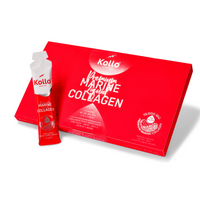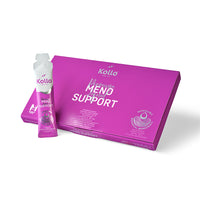What is marine collagen and why should you try it?

What is marine collagen and why should you try it?
Collagen is one of the most prevalent proteins in the body and one which plays a vital role in the health of our skin, ligaments, connective tissues, bones, and internal organs. Collagen supplements have been fast increasing in popularity over recent years, but it is specifically marine collagen that is taking the supplement market by storm. But what exactly is marine collagen and what are its benefits?What is collagen and how does it work?
Collagen is a major building block for our skin, muscles, connective tissues and blood vessels. It occurs naturally in the body, but as we age our native collagen levels deplete. This loss of collagen contributes to loss of volume in the skin and problems linked to our muscles and joints, such as arthritis and reduced mobility.
In order to restore our native collagen levels, increasing numbers of people are supplementing their diets with collagen peptides. These are created when collagen is hydrolysed in order to break it down into small, water-soluble particles which can be consumed, digested and utilised by the body.
Collagen peptides seem to act as <a href="https://www.ncbi.nlm.nih.gov/pmc/articles/PMC7146365/">antioxidants</a> to fight inflammation and free radicals in the body in order to slow the signs of skin ageing. They also seem to trigger the body's natural collagen production processes so that our native collagen levels increase.
What is marine collagen?
Marine collagen is derived from the scales, bones, fins and cartilage of fish. Many collagen supplements on the market use bovine collagen which is sourced from cows. Although marine collagen and bovine collagen are very similar, there is evidence to suggest that they work on the body in slightly different ways.
Bovine collagen appears to boost levels of collagen types 1 and 3 which are most prevalent in the skin. Meanwhile, <a href="https://www.ncbi.nlm.nih.gov/pmc/articles/PMC7230273/">marine collagen seems to increase levels of collagen types 1 and 2</a>, which are found not only in the skin but also in cartilage, within vertebral discs, and around eye structures. It appears that marine collagen could therefore be particularly helpful in supporting joint health when compared to bovine collagen. This makes it a brilliant choice for athletes, avid exercisers, or anyone who deals with stiff, achy joints.
Marine collagen supplements happen to be a more sustainable source of protein than other varieties – a factor that is important for many of us as we strive to be more conscious of the impact our diets have on the environment. Furthermore, marine collagen is suitable for those who want to avoid red meat as a result of their dietary preferences or for religious, moral or cultural reasons.
What can marine collagen do for you?
Marine collagen works to reduce signs of skin ageing. In a 2021 study, the <a href="https://www.ncbi.nlm.nih.gov/pmc/articles/PMC8176521/">Journal of Cosmetic Dermatology</a> reported that women aged between 45 and 60 noticed a 35% reduction in the severity of wrinkles after 12 weeks of marine collagen supplementation. It also found that skin elasticity, firmness and hydration all improved.
Although much more research is required to fully understand the impact of marine collagen on joint health, recent studies show it has great promise. In a <a href="https://www.versusarthritis.org/about-arthritis/complementary-and-alternative-treatments/types-of-complementary-treatments/collagen/">series of trials</a> examining the benefits of collagen on people with rheumatoid arthritis, it was found that type 2 collagen helped to relieve swollen, tender joints and improve walk time. Type 2 collagen is particularly prevalent in marine collagen, so it appears that this variety of collagen supplements could help those with joint problems to relieve their symptoms.

















